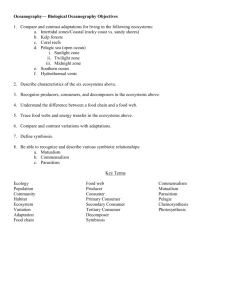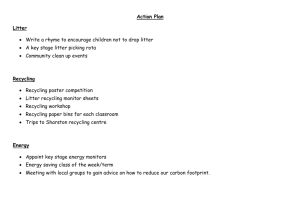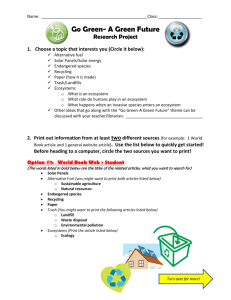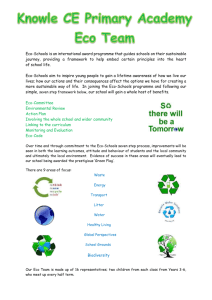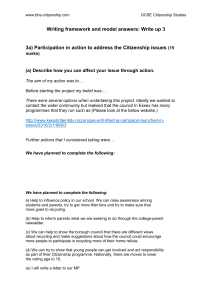DATE
advertisement
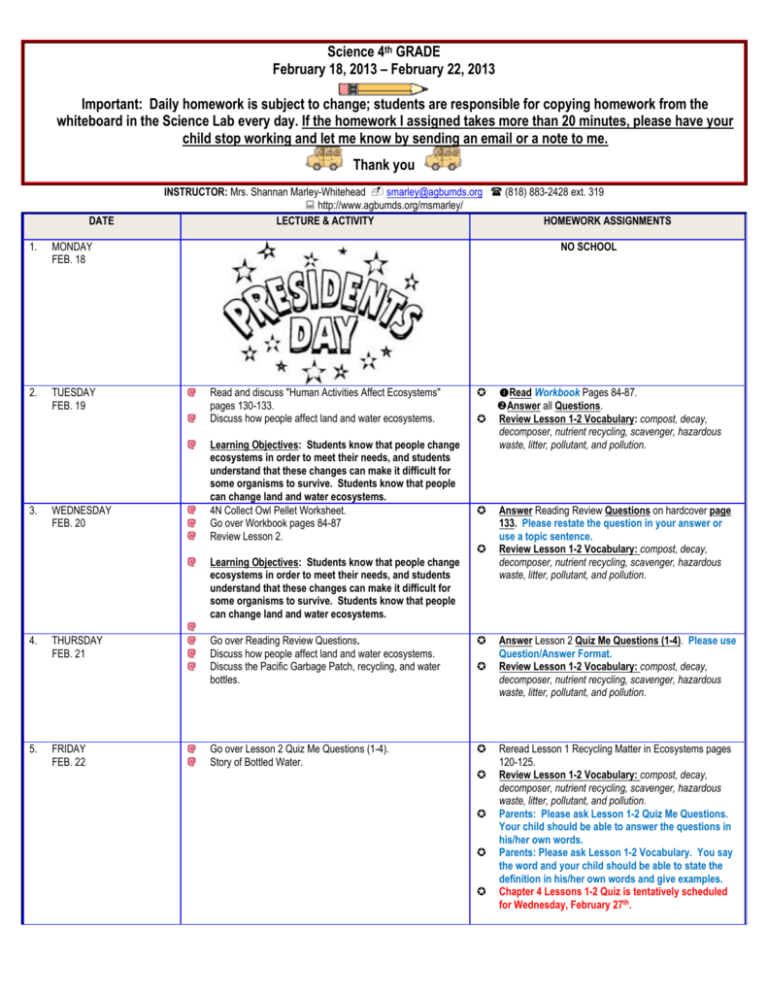
Science 4th GRADE February 18, 2013 – February 22, 2013 Important: Daily homework is subject to change; students are responsible for copying homework from the whiteboard in the Science Lab every day. If the homework I assigned takes more than 20 minutes, please have your child stop working and let me know by sending an email or a note to me. Thank you DATE 1. MONDAY FEB. 18 2. TUESDAY FEB. 19 3. WEDNESDAY FEB. 20 INSTRUCTOR: Mrs. Shannan Marley-Whitehead smarley@agbumds.org (818) 883-2428 ext. 319 http://www.agbumds.org/msmarley/ LECTURE & ACTIVITY HOMEWORK ASSIGNMENTS NO SCHOOL Read and discuss "Human Activities Affect Ecosystems" pages 130-133. Discuss how people affect land and water ecosystems. Learning Objectives: Students know that people change ecosystems in order to meet their needs, and students understand that these changes can make it difficult for some organisms to survive. Students know that people can change land and water ecosystems. 4N Collect Owl Pellet Worksheet. Go over Workbook pages 84-87 Review Lesson 2. Read Workbook Pages 84-87. Answer all Questions. Review Lesson 1-2 Vocabulary: compost, decay, decomposer, nutrient recycling, scavenger, hazardous waste, litter, pollutant, and pollution. Learning Objectives: Students know that people change ecosystems in order to meet their needs, and students understand that these changes can make it difficult for some organisms to survive. Students know that people can change land and water ecosystems. 4. 5. THURSDAY FEB. 21 FRIDAY FEB. 22 Go over Reading Review Questions. Discuss how people affect land and water ecosystems. Discuss the Pacific Garbage Patch, recycling, and water bottles. Go over Lesson 2 Quiz Me Questions (1-4). Story of Bottled Water. Answer Reading Review Questions on hardcover page 133. Please restate the question in your answer or use a topic sentence. Review Lesson 1-2 Vocabulary: compost, decay, decomposer, nutrient recycling, scavenger, hazardous waste, litter, pollutant, and pollution. Answer Lesson 2 Quiz Me Questions (1-4). Please use Question/Answer Format. Review Lesson 1-2 Vocabulary: compost, decay, decomposer, nutrient recycling, scavenger, hazardous waste, litter, pollutant, and pollution. Reread Lesson 1 Recycling Matter in Ecosystems pages 120-125. Review Lesson 1-2 Vocabulary: compost, decay, decomposer, nutrient recycling, scavenger, hazardous waste, litter, pollutant, and pollution. Parents: Please ask Lesson 1-2 Quiz Me Questions. Your child should be able to answer the questions in his/her own words. Parents: Please ask Lesson 1-2 Vocabulary. You say the word and your child should be able to state the definition in his/her own words and give examples. Chapter 4 Lessons 1-2 Quiz is tentatively scheduled for Wednesday, February 27th. California Content Standards Covered: LIFE SCIENCES 2. All organisms need energy and matter to live and grow. As a basis for understanding this concept: b. Students know producers and consumers (herbivores, carnivores, omnivores, and decomposers) are related in food chains and food webs and may compete with each other for resources in an ecosystem. c. Students know decomposers, including fungi, insects, and microorganisms, recycle matter from dead plants and animals. 3. Living organisms depend on one another and on their environment for survival. As a basis for understanding this concept: b. Students know that in any particular environment, some kinds of plants and animals survive well, some survive less well, and some cannot survive at all. d. Students know that most microorganisms do not cause disease and many are beneficial.

![School [recycling, compost, or waste reduction] case study](http://s3.studylib.net/store/data/005898792_1-08f8f34cac7a57869e865e0c3646f10a-300x300.png)
